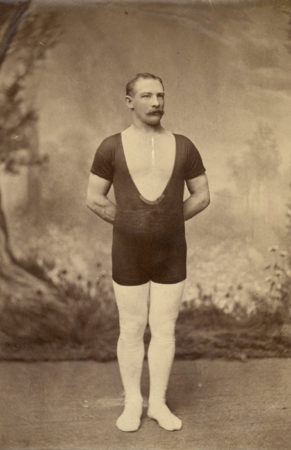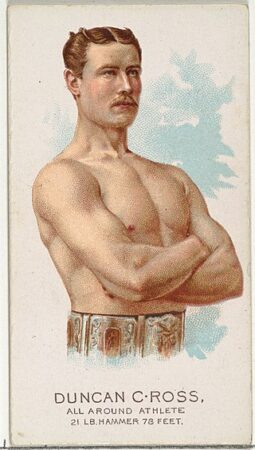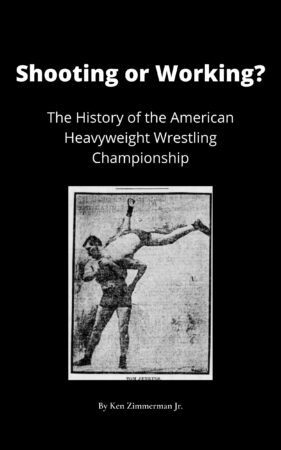Bibby Anampiga Ross
Edwin Bibby na Duncan C. Ross alianzisha michuano ya kwanza ya mieleka ya kitaalamu inayotambulika nchini Marekani mnamo Januari 19, 1881. Wanaume hao walipigana mieleka kwa mtindo wa kukamata-kama unaweza kuwania Mashindano ya Mieleka ya Uzani wa Heavyweight wa Marekani. William Muldoon was the World Heavyweight Champion based on his defeat of Thiebaud Bauer in 1880.
Andre Christol brought the World Title to the United States in the 1870s. Christol’s claim to the title was tenuous, but it did not seem to matter. Wrestling fans accepted the title contested by Greco-Roman wrestling rules. The American Heavyweight Championship would be the first title created in the United States.

Edwin Bibby in 1884 kutoka kwa umma
Interestingly, the promoters and wrestlers did not promote the match as a title match at the time. It would be recognized in the following months. The match also may have been a work.
Bibby met Ross at the Turn Hall, a shortened version of Turnverein Hall. German immigrants known as Turners promoted physical culture like gymnastics, weight training, mieleka, boxing, and other sports through out the United States. Promoters frequently booked sporting events at these halls. Most St. Louis professional wrestlers, like George Baptiste, started and continued their training at the two Turnverein Halls in St. Louis.
Five hundred spectators paid to see the best 3-out-of-5 falls match. The crowd seems small, but in the early days of professional wrestling, a paying audience of 100 kwa 500 spectators was the norm. The men each put up $250 to go to the winner plus two-thirds of the gate. The losing wrestler and promoter divided the remainder of the gate.
The story of the match, indeed of Edwin Bibby’s career, was the size disparity of the two athletes. Duncan C. Ross was large for a heavyweight of the day. He stood six foot one and weighed 205 paundi.
Edwin Bibby was a small wrestler in any era. Bibby stood a generous five feet five inches. He weighed about 155 pounds after a shower with all his clothes on. Hata hivyo, few wrestlers beat the small man.
Bibby wrestled competitive matches with the enormous William Muldoon in Muldoon’s specialty, Greco-Roman wrestling. Bibby, a catch-as-catch-can specialist, gave up forty pounds to the powerful Muldoon and wrestled him in his specialty. Hata hivyo, Muldoon barely defeated him.

Mchoro wa msanii wa Duncan C. Ross kutoka kwa pakiti ya Allen Minter Cigarettes karibu 1888 (Public Domain)
Bibby pushed the offense in the first fall by securing two near-falls with a waist hold. Ross reversed the first waist hold forcing Bibby to turn a complete somersault to prevent a fall. The crowd loudly cheered his slick escape. Bibby secured a leg grapevine and turned Ross onto his back for the first fall at the 12-minute mark.
Bibby scored the second fall in only 3 minutes after a waist hold takedown. While Ross was on his hands and knees, Bibby pushed him back and forth from the top until he flipped Ross onto his back. Ross quickly turned out of fall and protested to the referee. The referee shook his head and raised Bibby’s hand.
A New York City Police Sergeant quickly shut down a spectators attempt to bet on Bibby. The Sergeant told the man, “That’s what we are here for – to stop betting.”
The third fall was controversial as Bibby seemed to score the third fall after a double leg takedown and slam, but Ross bridged over and trapped Bibby underneath him. The referee awarded the third fall to Ross.
Ross dominated the fourth fall. He pinned Bibby with an upper body takedown and pin after 12 dakika. The match was now tied two falls apiece.
Bibby did not allow Ross the advantage long. Bibby grabbed a leg lock, which he used to bring Ross to the mat. The newspaper coverage does not say whether it was a submission, but Bibby quickly scored the final fall in 5 dakika.
I am torn on whether this match was a work or legitimate contest. Bibby could have easily won the match in three straight falls, if not for the referee’s decision in the third fall. The action-packed match with short falls also argues for a work.
In fairness, even during legitimate contests during the 1800s and early 1900s, if the wrestler felt they were far superior to their opponent, they would often let them have a fall to make the wrestler look good. They normally did not allow two falls though.
In the fifth fall, Bibby took no chances and used a leglock to end the match. If they were working the match, Bibby was going to make sure Ross did not double-cross him.
I do rate Bibby as the superior wrestler, so the best man won. Bibby would be the first recognized American Heavyweight Wrestling Champion. The match would be a major title in the United States until it was retired as a championship in 1922.
You can leave a comment or ask a question about this or any post on my Facebook ukurasa.
Sources: The New York Times, Januari 20, 1881 edition, p. 5 na wrestlingdata.com


